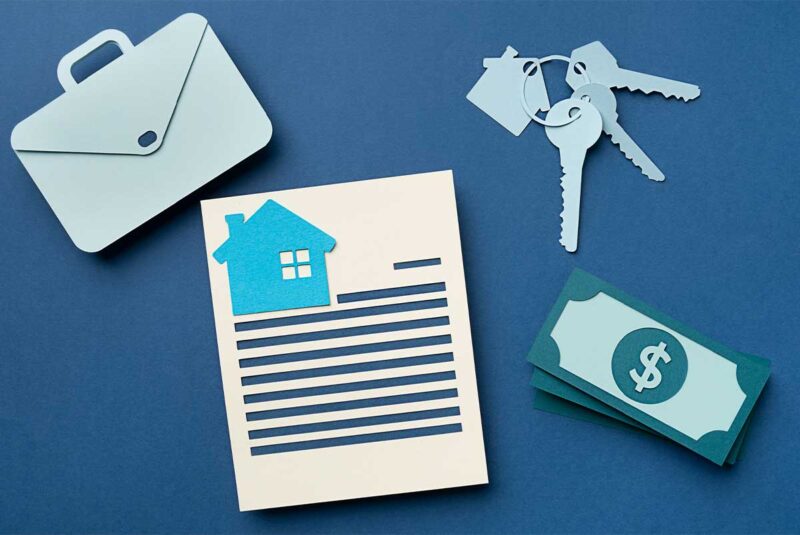Ready To Buy a Home?
Get Approved to Buy a Home
Rocket Mortgage® lets you get to house hunting sooner.
Maybe circumstances beyond your control have made it hard to meet all your financial obligations. Maybe you’ve defaulted on your mortgage payments and because of an underwater mortgage, you can’t sell your home or secure a standard refinance. If you’re in this situation, you may feel like your options for avoiding foreclosure are severely limited.
There is, however, one solution at your disposal: a short refinance. But that’s only as long as your lender agrees to it. Let’s look at how a short refinance may help you stay in your home.
What Is a Short Refinance?
A short refinance helps underwater homeowners who’ve defaulted on their mortgage payments and are trying to avoid foreclosure. A short refinance – which must be approved by your lender – typically reduces the principal balance of your mortgage loan because your lender forgives the amount you defaulted on, likely lowering your new monthly mortgage payments.
Short refinances were more common from 2010 to 2016 as part of the Obama administration’s Federal Housing Administration (FHA) short refinance program.[1] But mortgage lenders will sometimes agree to a short refi, especially if the cost of refinancing is significantly less than the cost of foreclosing.
How Does a Short Refinance Work?
If you’re in default on your mortgage loan, your lender may suggest a short refinance. You can also request a short refinance if you’re at risk of foreclosure and have negative equity in your home, which would make it very difficult – if not impossible – to get a traditional rate and term refinance.
If your lender approves, they’ll write off the difference between your new loan amount and the amount you owe on your original mortgage, replacing your existing loan with a new mortgage with lower monthly mortgage payments. You’ll often get the same loan term you had for your original mortgage, and you may be able to lock in a lower mortgage interest rate.
Let’s look at an example.
Example of a short refinance
Let’s say you purchased a $250,000 home. You made a $10,000 down payment and got a 30-year fixed-rate mortgage for $240,000.
Now you need to refinance to lower your monthly mortgage payment or risk foreclosure. Your home value has dropped from $250,000 to $200,000, and you owe $220,000 on your home loan.
If your lender agrees to short refinance your existing home loan, you’ll likely get a new 30-year mortgage for the home’s current market value ($200,000), and you won’t have to pay the $20,000 you owed on your original mortgage.
Short Refinance Pros and Cons
Let’s take a look at some benefits and drawbacks of short refinancing a mortgage.
PROS of a short refinance mortgage👍
With a foreclosure, your lender takes possession of your home or other real estate and sells the property to pay off your mortgage. Your credit score will take a significant hit, and it could be years before you’ve repaired your credit enough to buy a new home or rent a property. A short refinance lets you keep your home and minimizes the damage to your credit score.
A short sale has less impact on your credit score than a foreclosure, but you’ll lose the property.
If your lender agrees to a short refinance, your new loan amount will be lower, which will likely result in more affordable monthly payments.
CONS of a short refinance mortgage👎
Your score won’t drop as drastically as it would with a foreclosure or a short sale, but a short refinance will likely lower your credit score.
The IRS classifies canceled debt as income. Depending on the amount, you’ll probably pay taxes on the loan amount your lender forgave.
Short refinances are rare because mortgage lenders lose money on them. Unless a short refi is cheaper than a foreclosure or short sale, your lender won’t have much incentive to greenlight a short refinance.
Short Refinance Alternatives
A short refinance is one option to help avoid foreclosure. Let’s look at other options that may be available to you.
Forbearance
A mortgage forbearance temporarily pauses payments on your home loan. When the pause ends, you make up the missed payments by reinstating your mortgage, establishing a repayment plan, requesting a loan modification or taking advantage of another option.
Forbearance can buy you some time to increase your income, build your savings, pay down higher-interest debt and improve your overall finances.
Rate and term refinance
If you’re not in mortgage default yet and your loan-to-value ratio (LTV) is around 80% or less, you may qualify for a rate and term refinance. With a rate and term refinance, you may be able to lock in a lower interest rate while extending your mortgage term. Both strategies could lower your monthly mortgage payments.
Like any loan, a rate and term refinance will cost money. You’ll pay closing costs, which include origination and appraisal fees. Depending on your lender, they may agree to fold these upfront costs into the loan. A rate and term refinance may not be an option if you’ve defaulted on your mortgage or have negative home equity.
Short sale
You may want to consider a short sale if you can’t get a forbearance or a rate and term refinance. With a short sale, a lender allows you to sell your home for less than what you owe on your mortgage.
Remember, a short sale will be recorded on your credit report and damage your credit score. The sale proceeds go to the lender, who can either forgive the outstanding mortgage balance or seek a deficiency judgment. You’ll pay the outstanding mortgage balance if a judge grants a deficiency judgment.
Deed in lieu of foreclosure
If you and your lender agree to a deed in lieu of foreclosure, you’ll hand over your home’s deed in exchange for total mortgage balance forgiveness. While a deed in lieu of foreclosure will appear in your credit history, it won’t have as much impact as a foreclosure.
Don’t Short Yourself on Homeownership
If your lender approves a short refinance, it may be easier to pay off your mortgage. But most importantly, you’ll be able to stay in your home sweet home.
Get approved to buy a home.
Rocket Mortgage® lets you get to house hunting sooner.
The Short Version
- A short refinance helps underwater homeowners who’ve defaulted on their mortgage payments and are trying to avoid foreclosure
- If your lender agrees to a short refinance, your new loan amount will be lower, which will likely result in more affordable monthly payments
- You can also request a short refinance if you’re at risk of foreclosure and have negative equity in your home
U.S. Department of the Treasury. “Making Home Affordable.” Retrieved September 2022 from https://www.acgov.org/cda/hcd/documents/mls_obama_making_homes_affordable_program.pdf




